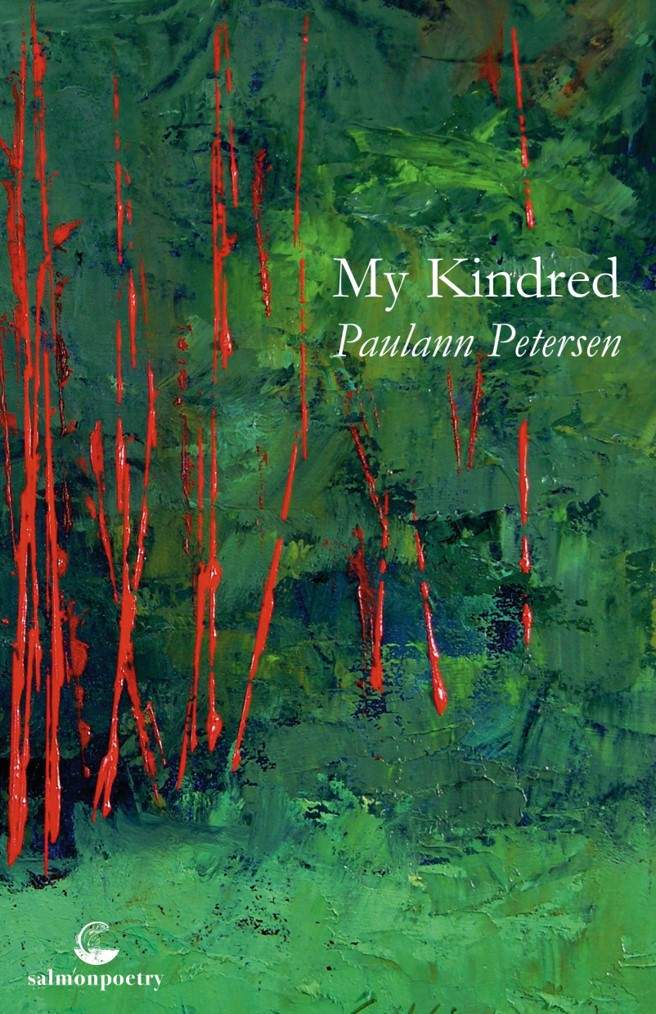Reviewed by Melody Wilson
My Kindred by Paulann Petersen
Salmon Poetry, 2023
Available: Powell’s Books, Broadway Books, Annie Bloom’s Books, Amazon

Paulann Petersen’s My Kindred might seem to be about family, but it’s much more. The book invites us into a much broader exploration. The first poem, “Inhabited,” teaches us how to read the book beginning with an image of the speaker’s eyes imprinted by the vein-tracery of a maple’s leaf-children. We imagine veins in the speaker’s eyes, arms outstretched into limbs, hair leafing. Owls populate the limbs and by extension its sister, the poet, who moans, then creaks. The tree/sister/poet’s ear reverberates with all of nature.
“Inhabited” establishes the breadth of My Kindred while invoking the muses. But the reader becomes the muse, a collective muse rather than the traditional version. The invocation, appears at the precise center of the first page:
What to do, but invite them all
to come and live
here, inside me?
The second poem, “First Task,” prepares us for the journey with the speaker sweeping fallen blooms from her porch along with her illusions, creating
…an openness
Ready for a next spent bloom
to fall. An emptiness
where I can place my feet.
The action is both domestic and spiritual. And like an anchorite or a homemaker, the poet prepares us for the third poem in the book, “My Muse.”
“My Muse” begins with an epigraph from Heiltsuk tradition that reads:
––A wolf does not appear to us
unless it wants to tell us something
The Heiltsuk culture has its roots in British Columbia, an apt antecedent for the opening of the poem:
On the Alaska Fur Shop label
inside each jacket, stole, and cape
my grandfather made,
a she-wolf lived.
Then…
When I finally began to write poems,
she told me…
To what I make, she is sister.
She and my poems speak the same tongue.
The reader pictures a child in her grandfather’s shop. We imagine the label: pointed nose, ruff, the child’s thumbnail ticking over tiny gray stitches.
The poems in this collection effortlessly trace the poet’s catalogue of kindred—wolves, trees, owls, raptors, readers, women, all sisters in this beautiful, open-hearted explication of a sliver of world by a poet with nothing to prove and a great deal to share.
But there’s another kindred as well. Petersen’s literary kindred. Some of these literary kindred are mentioned by name, others lurk between the lines, but they forge a common language, an ambience that binds the book together.
For example, Anaïs Nin provides the epigraph to the poem “The World After”:
––Surely our parents give birth to us twice,
the second time when they die.
Petersen opens the “The World After” with My second birth comes parceled out/in two halves.
In this poem the speaker finds herself an adult without parents, a common event and one we see sometimes in poems, but it’s the close of the poem––I stand alone. Too new, too raw/even to fill my lungs/and let loose/a first cry––that is particular to Petersen. The interpretation of this essential loss is viewed from the position of a child even though it’s experienced as an adult. Being orphaned, even as an adult, is as much a separation as first birth.
A few poems later in “My Parents’ Ashes,” Petersen describes the remains of her parents after cremation with even more honesty,
Mostly they’re dust…
…a powder
that muffles every gleam—
one intent on taking to the air
and flying away into nothing.
Despite the parents’ importance, they are intent on flying away into nothing. The poem becomes even more visceral when we picture, in the speaker’s palm, their tangible remains, bits of bone./Chips. Nubs. Tiny beads. The speaker identifies these remains as sacrum, the bone she says is least likely to burn. Petersen uses that traditional belief by applying it to the Words on this page, which she instructs to:
…carry
My father and mother, my Whitmans.
Be the seeds that remain
when burning is done.
Be sacrums, too. Make
this much of my parents
stay alive.
With this beautiful dedication to her parents, Petersen steps onto the ferry with all her literary predecessors: Ophelia, Calypso, voices named and unnamed.
For example, in “Eve Explains The Fall,” we learn from the source that From the start, most things/were horizontal, that What’s called/the Fall from Grace/was more a lateral move, and in fact, that the only mention of falling/came from Adam.
Petersen uses masculine sources as well, such as Rilke and Whitman, but always with open-handed, unflinching feminism. The book is engaging, insightful, sometimes ironic, and always iron-clad.
My Kindred is part love letter, part modern day metamorphosis spun by a poet who earns our trust with the intricate delicacy of antlers and storm. It’s a book with the sensuality of apple flesh and the intricacy of a hornet’s eye. You’ll find yourself on every page.
Previously Published in Blue Mountains Review, Issue 30, September 2023
About the Reviewer
Melody Wilson is a pushcart-nominated poet whose poems appear in Pangyrus, VerseDaily, The Fiddlehead, Crab Creek Review, San Pedro River Review and elsewhere. She is pursuing her MFA at Pacific University. Her chapbook, Spineless: Memoir in Invertebrates came out in 2023. Find more of her work at melodywilson.com.
